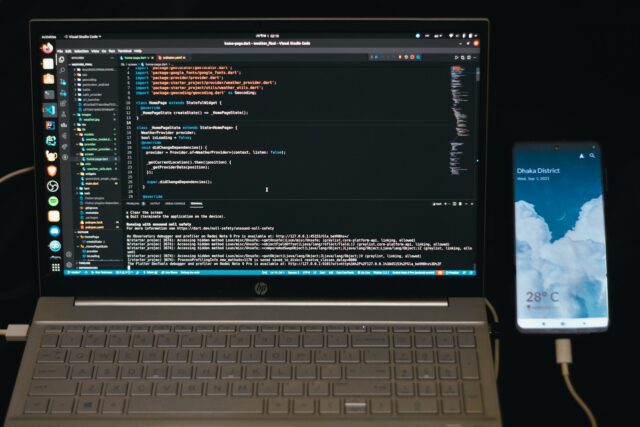
Java is a programming language that is widely used to build mobile applications for various platforms such as Android, iOS, and Windows. The language is known for its flexibility, platform independence, and object-oriented approach.
There are a lot of Java-based frameworks, libraries, and testing and debugging tools, using which software engineers can create feature-rich, user-friendly, and secure mobile applications. Java is a valuable tool for mobile app developers seeking to build high-quality apps for a range of platforms.
Understanding Java for Mobile App Development
Basics of Java programming language
Java software development services are aimed at building a variety of applications, including desktop, web, and mobile applications. Check out some basics of this programming language in the context of software development services:
- Object-oriented programming. The language is based on the concept of objects, i.e., developers use classes to define objects and their behaviors, which makes it easier to manage and reuse code.
- Platform independence. Applications written in Java can run on any operating system without requiring any changes to the code. This is because programs are compiled into an intermediate language called bytecode, which can be executed on any machine that has a Java Virtual Machine (JVM) installed.
- Syntax. Java has a C-style syntax, which means that it uses curly braces to define blocks of code and semicolons to separate statements. Java programs are organized into classes, and each class contains methods, which are blocks of code that perform specific tasks.
- Memory management. Java has automatic memory management, which means that developers do not have to manually allocate and deallocate memory. This automatic garbage collector frees up memory that is no longer needed, which helps prevent memory leaks and improves the performance of the application.
- Libraries and frameworks. Java has a vast collection of libraries and frameworks that developers can use to simplify and accelerate the code-writing process. Some popular frameworks include Spring, Hibernate, and Struts, which provide pre-built components for common tasks such as database access and web development.
Overall, understanding the basics of Java programming language is essential for software development services that involve building robust and scalable applications. By leveraging the powerful features of this language, developers can build high-quality software that meets the needs of their clients and end users.
How Java works in mobile app development
- Java Development Kit (JDK). Mobile app development begins with the installation of the JDK, which includes the Java compiler, Java Runtime Environment (JRE), and other tools necessary for app development.
- Java Virtual Machine (JVM). Java programs are compiled into bytecode, which is executed by JVM — a runtime environment that allows Java code to run on any platform. This makes Java a platform-independent language.
- Android SDK. This software development kit includes a set of tools and libraries for building, testing, and debugging Android apps. Java Development Kit is part of Android SDK, so programmers can use Java to write Android apps.
- Android Studio. This is an integrated development environment (IDE) comprising a code editor, a visual layout editor, and a set of tools for testing and debugging apps. Android Studio supports Java and Kotlin, another popular programming language for Android app development.
- Java-based frameworks. Mobile engineers can also use frameworks such as Android Native Development Kit (NDK), Android Architecture Components, and Firebase, which provide pre-built components for common tasks such as user authentication, database access, and push notifications.
- App deployment. Once the app is developed, it needs to be deployed to the Google Play Store or other app stores. Android solutions are packaged as Android Application Package (APK) files, which include the compiled code, resources, and manifest file. The APK file can be uploaded to the app store and downloaded by users.
Advantages and Disadvantages of Using Java for Mobile App Development
Advantages:
- Platform independence. The language is platform-independent, which means that the same code can be used to build apps for different platforms, including Android, iOS, and Windows.
- Large developer community. Having emerged from backend and embedded IT solutions development, Java is an extremely mature language with a large and active developer community. The mobile Java community provides a wide range of resources, tools, and frameworks to simplify and accelerate mobile app development.
- Object-oriented programming. Based on the OOP concept, developers can write modular and reusable code, reducing development time and improving app performance.
- Automatic memory management. Java has automatic memory management, which means that developers do not have to worry about managing memory allocation, deallocation, and garbage collection. This reduces the likelihood of memory leaks and improves app performance.
- Rich set of libraries and frameworks. Java has a vast collection of libraries and frameworks, such as Spring and Hibernate, that provide pre-built components for common tasks, such as database access, authentication, and user interface design.
Disadvantages:
- Slower performance. Java-based mobile solutions may run slower than native apps, as the code needs to be interpreted by the JVM. However, this can be mitigated through optimization techniques and the use of native code.
- Larger app size. Since JVM and other libraries are included in the app package, mobile apps tend to have larger file sizes than native apps.
- Limited access to platform-specific features. Mobile apps written in Java may have limited access to cameras, GPS, and other sensors, compared to native apps.
- Higher battery consumption. JVM and code interpretation make mobile software consume more battery power than native apps.
Best Practices for Java-based Mobile App Development
When it comes to mobile app development, following best practices can help ensure that your app is reliable, secure, and high-performing. Here are some best practices:
- Use an Agile methodology. Agile development is an iterative approach to software creation that emphasizes collaboration, flexibility, and rapid delivery. Using an Agile methodology can help you respond quickly to changing requirements and deliver high-quality apps on time.
- Optimize for performance. Java mobile apps can suffer from performance issues, especially on low-end devices. To optimize performance, use efficient algorithms, minimize memory usage, and reduce network calls. You can also use performance profiling tools to identify and fix bottlenecks in your code.
- Use design patterns. Leverage reusable solutions to common software design problems in order to write more modular, reusable, and maintainable code. Some popular design patterns for Java-based mobile app development include MVC, Observer, and Singleton.
- Secure your app. Security is a critical concern in mobile app development. Use secure coding practices, such as input validation, error handling, and encryption, to protect your app against attacks. You should also regularly update your app with security patches and keep up-to-date with the latest security threats.
- Test early and often. Testing is an essential part of software development. Test your app as frequently as possible to catch bugs and ensure that your app works as expected. You can use automated testing frameworks, such as JUnit and Mockito, to automate your testing and reduce manual effort.
- Use version control. Version control is a system that allows you to manage changes to your code over time. Using it, you can keep track of changes, collaborate with other developers, and revert to previous versions if needed. Git is a popular version control system.
- Follow coding standards. Adopt a coding standard, such as Google Java Style or Oracle’s Java Coding Standards, and enforce it throughout your team. This will help you write consistent, readable, and maintainable code.
Future of Java in Mobile App Development
Java has been a popular programming language for mobile development for many years, and it is likely to continue to be so in the future. Here are some reasons:
- Java is a mature language. The language has been around for almost three decades and has evolved over time to become a robust, reliable, and widely used language. Its maturity means that it has a large developer community, a wide range of libraries and frameworks, and extensive documentation.
- Java is cross-platform. Java is a platform-independent language, meaning that its code can run on different platforms without modification. This makes it ideal for developing mobile solutions that need to work across different devices and operating systems.
- Java is object-oriented. The OOP model makes it easier to write modular, reusable, and maintainable code. This is especially important in mobile app development, where apps need to be updated frequently and scaled to accommodate growing user bases.
- Java is constantly evolving. The language is not stagnant; it continues to evolve with new releases and updates. The latest version of Java, Java 17, was released in September 2021, and it includes new features and enhancements that make it more suitable for modern mobile app development.
- Java has a strong presence in the enterprise. Many large organizations have existing Java codebases and experienced developers. This means that the language is likely to continue to be used for mobile app development in the enterprise space.
Of course, Java is not without its challenges in mobile app development. One of the main challenges is its relatively slow performance compared to native code. However, this can be mitigated through optimization techniques and the use of native code.
Conclusion
To wrap it up, Java is going to have a bright future in the context of mobile solutions, thanks to its maturity, cross-platform capabilities, object-oriented programming model, ongoing evolution, and strong presence in the enterprise. As mobile solutions continue to evolve, Java is likely to remain a popular choice for developers and businesses alike.










